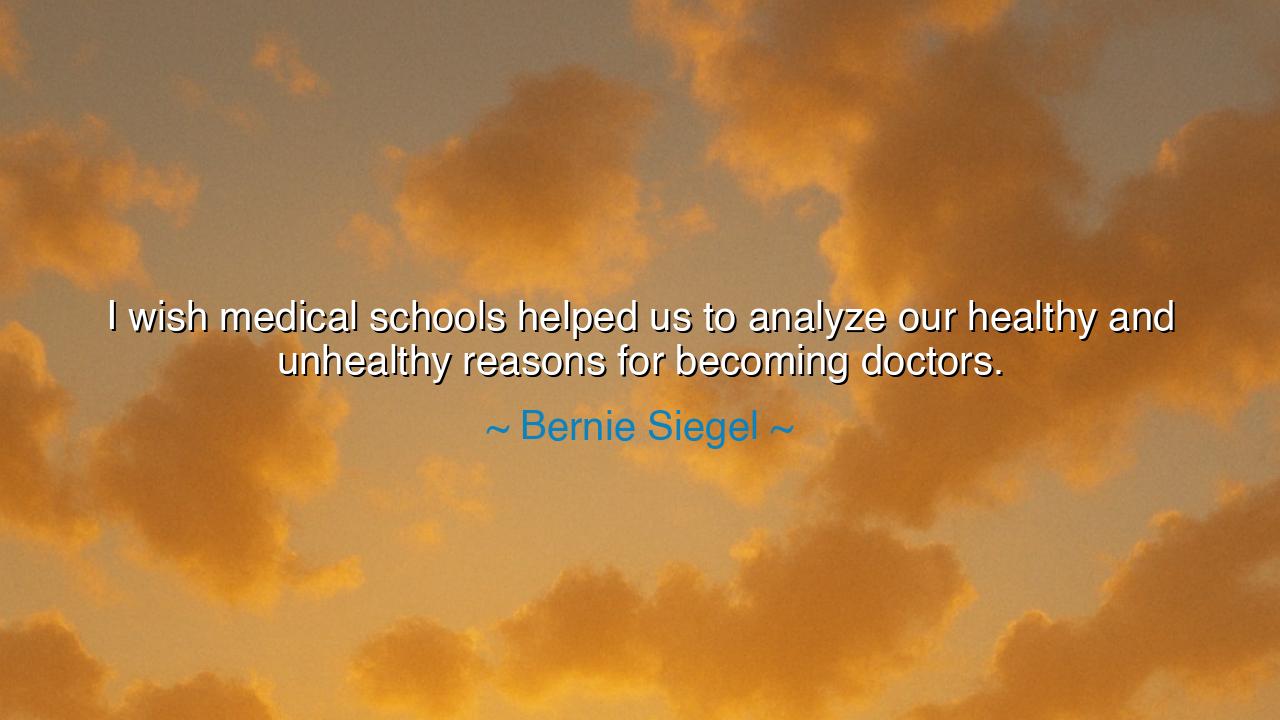
I wish medical schools helped us to analyze our healthy and
I wish medical schools helped us to analyze our healthy and unhealthy reasons for becoming doctors.






The words of Bernie Siegel—“I wish medical schools helped us to analyze our healthy and unhealthy reasons for becoming doctors.”—carry the weight of hard-won wisdom. They speak not only to physicians but to all who would dedicate their lives to service. In them is a call for self-knowledge, for before one can heal the body of another, one must first examine the motives that dwell within the heart. For the desire to become a doctor is noble, yet it can be tainted by ambition, fear, or the hunger for power, and unless these are recognized, they can corrupt both healer and patient alike.
From ancient times, the vocation of the healer was sacred. The oath of Hippocrates was not merely a pledge to practice medicine but to practice it with purity of spirit. To heal is to stand at the threshold between life and death, wielding knowledge that can comfort, cure, or wound. Siegel reminds us that the true challenge is not only the mastery of anatomy and science, but the mastery of self. For if one’s reasons for healing spring from pride, from the need to dominate, or from the hunger for wealth, then the healer becomes not a servant of life but a servant of ego.
History gives us vivid examples of both healthy and unhealthy motives. Consider Albert Schweitzer, who set aside fame as a musician and theologian to dedicate his life to medicine in Africa. His motive was rooted in compassion and reverence for life, and his legacy is remembered as an offering of service. Contrast this with those in history who sought medicine only for status, who exploited patients for profit, or who experimented cruelly in the name of science. Their knowledge was great, but their motives were corrupt, and thus their deeds are remembered with shame.
Siegel’s reflection also reveals the silence in modern medical schools, where students are taught to dissect the body but rarely to dissect the self. They learn to diagnose illness, yet are seldom asked to diagnose the reasons they chose this path. Was it out of love for humanity, or fear of death? Was it to serve the suffering, or to earn the esteem of society? To answer these questions with honesty requires courage, yet without them, the healer risks losing their soul even as they gain skill.
There is great humility in these words. Siegel does not condemn the unhealthy reasons—he acknowledges them as part of the human condition. For who among us acts always with pure intent? The wisdom lies in recognition. By analyzing both the noble and the flawed within ourselves, we may temper pride with compassion, ambition with humility, and fear with love. Thus, even impure motives can be transformed into fuel for service, if they are brought into the light and not hidden in shadow.
The lesson is clear: before you choose your path—whether medicine, teaching, leadership, or art—examine your heart. Ask yourself: why do I walk this road? What in me seeks healing, power, or recognition? And what in me seeks love, service, and truth? To know yourself in this way is to build your vocation upon a foundation that will endure storms. Without this self-knowledge, even the greatest skill may collapse under the weight of unexamined desires.
Practical action lies before us: medical schools, and indeed all schools of service, should create spaces for reflection and dialogue, where students can explore their motives with honesty. Mentors should guide not only the hand but the heart. And for each of us, even outside medicine, we must practice self-examination. Let us ask ourselves, again and again, whether our actions spring from fear or from love, from pride or from service. By doing so, we cultivate integrity, the root of all true greatness.
So let Bernie Siegel’s words be remembered as a gentle but urgent teaching: to heal the world, you must first understand why you seek to heal at all. For in knowing your reasons—both the light and the shadow—you will walk your path with clarity, humility, and strength. And in that clarity, you will not only heal others, but also yourself.






AAdministratorAdministrator
Welcome, honored guests. Please leave a comment, we will respond soon